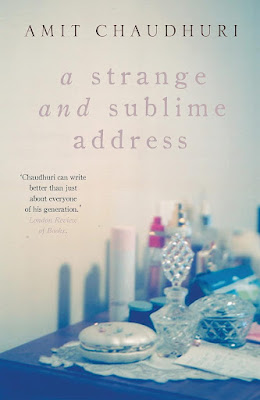A Strange and Sublime Address
A Strange and Sublime Address
By Amit Chaudhuri
Book Blurb:
From GoodReads:
Sandeep is an only child living
in a Bombay high-rise and in this book makes two long visits to his extended
family in Calcutta. This novel tells the story of the atmosphere in the small
house where they live. Chaudhuri writes precisely and carefully trying to
capture in the rhythms of his prose the faded happiness of things, the strange,
pure remembered moments.
From Amazon:
It features a Bengali boy who
spends his school holidays at his uncle’s home in Calcutta. Heatwaves,
thunderstorms, mealtimes, prayer-sessions, shopping expeditions and family
visits create a shifting background to the shaping of people’s lives. Delicate,
nuanced, full of exquisite detail, Strange and Sublime Address is a small
masterpiece. The book also includes nine short stories about the city.
My Review:
“Pieces of boal fish, cooked
in turmeric, red chilli paste, onions and garlic, lay in red, fiery sauce in a
flat pan; rice, packed into an even white cake, had a spade-like spoon embedded
in it; slices of fried aubergine were arranged on the white dish; dal was
served from another pan with a drooping ladle; long, complex filaments of
banana-flower, exotic, botanical, lay in yet another pan in a dark sauce; each
plate had a heap of salt on one side, a green chilli, and a slice of sweet-smelling
lemon. The grown-ups snapped the chillies (each made a sound terse as a satirical
retort), and scattered the tiny, deadly seeds in their food.”
The short novella has no story
structure, no beginning, middle or end. It is a slice of life, of routine
events that goes on in a household in summer, and about the multiple people
living in there. It is all about rejoicing the mundane everyday lives. And the
prose is beautiful, luxurious descriptions, admirable narration of the day-to-day
activities. Consider this –
“He liked the sight of his
aunt surrounded by her gods in that tiny room, like a child in a great doll-house,
blowing the conch eloquently; it was a strange sight, to watch a grown-up at
play. Prayer-time was when adults became children again.”
You won’t be able to devour it
but rather enjoy it one page at a time, reminiscing the good old bygone days of
childhood. The joy of slow life. Of eating dollops of rice with fish curry. Of
Thin Arrowroot biscuits, Boroline Antiseptic Cream, The Statesman, the radio
and afternoon naps. Of feeling time pass slowly through power-cuts, mango
season, initial rains and fun and frolic with cousins. Those summer holidays at
your uncle’s or grandfather’s house. The 90s, the era before the internet came
into picture, before technology could increase the pace of life.
“Each time he put a small
dollop of the yogurt in his mouth, and chewed on the khoi patiently he tasted
his childhood. It was made of the sourness of yogurt, the sweetness of sugar,
and the grey taste of bananas. Also the warmth of his mother’s fingers from
which he ate the mixture. It was as if his memory resided in the small,
invisible taste-buds in his tongue rather than in his brain.”
It was first published in 1991,
it being the author’s first novel. And in simplicity of the lives portrayed in
here, it is nothing short of a masterpiece. Such detailed observation of the
world is so new for me, so refreshing, so serene. Best for those searching for
a light read, ideally for the golden hour.
About the Author:
Amit Chaudhuri is the author of
five novels, the latest of which is The Immortals. Among the many prizes he has
won for his fiction are the Commonwealth Literature Prize, the Betty Trask
Prize, the Los Angeles Times Book Prize, and the Sahitya Akademi Award. He is
also a highly respected critic, a fellow of the Royal Society of Literature and
Professor of Contemporary Literature at the University of East Anglia. Amit
Chaudhuri lives in Kolkata and Norwich, and is also an acclaimed musician.









Comments
Post a Comment